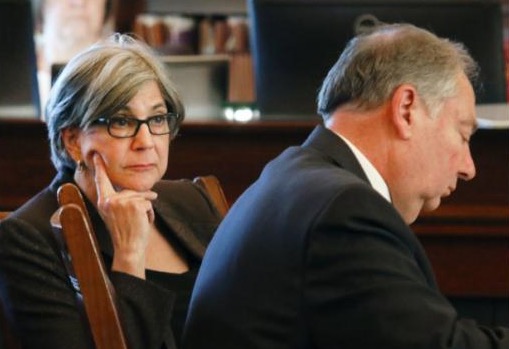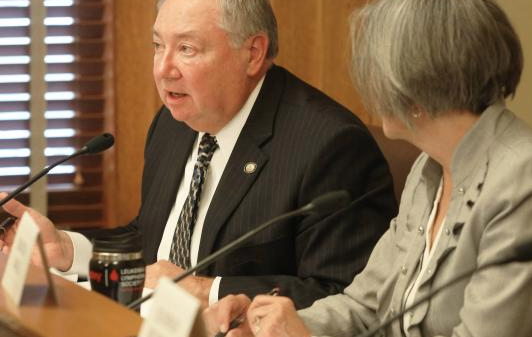The 2020 Kansas legislative session will long be remembered not for the COVID-19 crisis but for the hyper-partisan theatrics and obstructionism of two soon-to-be former state Senators.

Senate President Susan Wagle (R-Wichita) used her powers to block nearly all legislation from coming to a vote during the 45 legislative days prior to a slightly early first adjournment necessitated by the rapid spread of a deadly virus and the need to get it under control.
TAKE A LOOK BACK WITH US FOR A MOMENT: Early in the session, Wagle determined that the most important piece of legislation was a constitutional amendment that would allow the legislature to adopt whatever restrictions they wished on abortion services and providers. Two organizations, in particular, were pressing the amendment – Kansans for Life and the Kansas Catholic Conference – after the Kansas Supreme Court ruled that a woman’s right to choose was protected in the Kansas Constitution. Wagle led the effort in the Senate to pass the amendment.
The amendment was defeated in the House when pro-choice legislators were joined by even some anti-abortion legislators calling for a change in the election date. Constitutional amendments must be passed by the legislature and then submitted to the voters. This resolution called for the vote to happen during the August primary when voter turnout is notoriously low. Proponents of the amendment refused to change the date to the November general election. It was pointed out that their campaign slogan, “Let Kansans Vote,” was in conflict with their insistence on putting the amendment on the ballot in the lowest turnout election.
When the amendment failed in the House and the proponents refused to compromise by moving the date to a high turnout November election, Wagle dug in and announced that no bills would come to the Senate until the House capitulated to her demands and passed the constitutional amendment with the August date. And true to her word, Wagle effectively prohibited the Senate from doing anything for 45 days except collect their pay. This was pointed out brutally on the Senate floor during the sine die debates by Sen. Vic Miller (D-Topeka) who pointed out how few days the Senate had engaged in, even debate, on bills. We checked and of 45 legislative days, only 11 had bills up for debate. Thirty-three (33) days had no bills on general orders (the debate calendar) or were pro-forma (gavel in at 8:00 a.m. then go home). One day was cancelled so those who were interested could attend the Chiefs’ Superbowl parade in Kansas City.
THEN COVID-19 HIT HARD: With little legislative action, when the COVID-19 pandemic hit Kansas and Governor Laura Kelly instituted emergency orders to contain the spread and save lives, the legislature rushed to successfully fulfill their one constitutional mandate – the passing of a budget. They did that before leaving Topeka on March 19.
From mid-March until now, Governor Kelly has been working to protect the lives of Kansans and, as we’ve seen all across the country, that has angered folks who don’t believe in science, don’t like to be told what to do even if it would save lives, or accept crackpot conspiracy theories fed to them on the internet. Lots of people in Kansas, particularly small business owners and their employees, have been hit very hard by the restrictions required to contain the virus. Getting struggling Kansans back to work and the economy back on track is vital. And all Kansans are anxious to get back to something resembling the normal we once knew. But a strong majority of Kansans and Americans across the nation want to be protected. They understand the safety of our children and families is paramount and the gains our state has achieved have been the result of necessary efforts to contain this disease that, to date, has claimed more American lives than were lost during the entirety of the conflict in Vietnam…by double (and still counting). We all want to get back to work and “normalcy” but not until it is actually safe to do so.
BACK TO PRESENT DAY: Unfortunately, conservatives like Wagle and Senate Majority Leader Jim Denning (R-Overland Park) decided the frustrations expressed by some and the crisis we’re all facing are an opportunity to promote hyper-partisan divisions while citizens throughout Kansas are suffering. They decided this was their moment to attack Governor Kelly for the potential to secure political gain. We suppose Wagle thinks this will fuel her floundering campaign for the U.S. Senate. Is she positioning herself to “out-conservative” Kris Kobach? Remember, that even President Donald Trump and U.S. Senator Pat Roberts (R-Kansas) have praised Governor Kelly’s response to the crisis. For Wagle, none of that matters more than her ambitions as a career politician.
And so the legislature arrived in Topeka for their sine die session – usually a ceremonial end of the session but now an opportunity to foam at the mouth in an attempt to score political points. This 24-hour session was not about good policy. It was not about helping Kansans struggling to get by during a pandemic. It was not about dealing with a looming budget deficit. No, this 24 hours was about attacking and trashing Governor Kelly. It was about the self-proclaimed “pro-life” Wagle publicly referring to Governor Kelly as a “dictator” for her efforts to save lives, all while proceeding with a strategy along with Senator Denning to step on the throat of democracy, crushing any attempts to debate, amend or even consider legislation that she had not approved.

For this reason, the bulk of sine die was spent crafting a bill that will strip the duly-elected Governor of the ability to extend an emergency declaration and implement efforts to protect the lives of Kansans during the worst pandemic since the 1918 Spanish flu.
The Republicans’ bill, crafted primarily by hyper-partisan conservatives like Wagle and Denning with the full cooperation of House Speaker Ron Ryckman (R-Olathe), takes disaster declarations away from the Governor and puts them in the hands of five Republican legislators. It strips the Governor of any say in the distribution of COVID-19 stimulus money and gives such authority to six legislators. It says individual counties can ignore emergency declarations and restrictions. And when they end the emergency on May 31, they were sure to give liability immunity to businesses that don’t work to protect their clientele from the spread of a deadly disease.
As icing on their conservative cake, in the middle of a pandemic, Senate Republicans – with three exceptions – voted once again to deny health care access to 130,000 low-income working Kansans. Because who needs health care during a pandemic? Apparently, only the wealthy. The only Republicans who voted to allow a vote on Medicaid expansion were John Doll (Garden City), John Skubal (Overland Park), and Mary Jo Taylor (Stafford). Senator Dinah Sykes (D-Lenexa) offered the Medicaid expansion amendment and all the Democrats supported the effort. While Denning and Wagle attack Laura Kelly, other Republicans have other thoughts.
“My comfort level is working with the delegation and more especially Gov. Kelly and her emergency management team. I think they’re doing a great job.” U.S. Senator Pat Roberts (R-Kansas)
Democracy dies in the hyper-partisan atmosphere
If you followed the events that transpired last night into the early morning, we imagine you were- like us- distressed at the way in which the Senate, in particular, was run on sine die (Latin for “without day”). Despite the fact Denning had offered a motion that “an emergency be declared and the rules suspended for the purpose of debating, amending, and passing” certain bills; when he discovered that some legislators actually did plan to debate and amend those bills before passing them, he cut off debate.

Angry that Democrats had criticisms of his bills or ideas to make them more palatable, Denning announced he would “call the question” on every bill. He would get Republican support for his motions and that would ensure Democrats were silenced and all amendments would die in the late-night darkness while most Kansas citizens were sleeping.
At one point, the Senate went into recess and the Republicans had a caucus meeting. It was reported by the press that during that meeting Denning told Senate Republicans they would be moving all remaining legislation to conference committees “to avoid this floor nonsense that’s going on with the Democrats.”
Denning’s statements and actions were contrary to spirit of democracy. One might remind him that Democrats and moderate Republicans were also elected by a majority of voters and those voters deserve a voice in the Statehouse EVEN IF DENNING AND WAGLE DON’T WANT TO HEAR THEM.
The mess that was sine die 2020 was created by the failed leadership of Susan Wagle and Jim Denning. There is no other way to put it. While good legislation and amendments were left to evaporate into the night, Wagle and Denning did take time to express their farewells to the body as they each leave the Senate for what is likely the last time. The actions of Senate Republican leaders on this day shall be a stain on the history of the Kansas Legislature. What was clear, is that Wagle, Denning, and their supporters were perfectly content with that legacy.
The Big Three, Legislatively
There were a number of conference committee reports passed on sine die but three were of particular interest to us.
CCR 2054 contains changes to the Emergency Management Act, stripping the Governor of authority to act in the COVID-19 emergency. The report has plenty of other provisions as well such as taking decisions about the COVID-19 stimulus money away from the Governor and providing liability immunity for business for COVID-19 related claims.
CCR 2510 contains a number of education provisions, none of which are particularly controversial. Among those provisions is the expansion of free ACT testing to private school students, some post secondary scholarships for high demand CTE areas, and new provisions allowing school districts at their discretion to pay tuition and fees for students in dual or concurrent enrollment classes at post secondary institutions.
CCR 2702 contains a number of property tax provisions including certain reporting and voting requirements for municipalities, restrictions prior to spending funds raised through new valuations, and protections for those unable to promptly pay property taxes during the pandemic.
We will be reviewing all of these in greater detail over the weekend and will report more on them next week.


